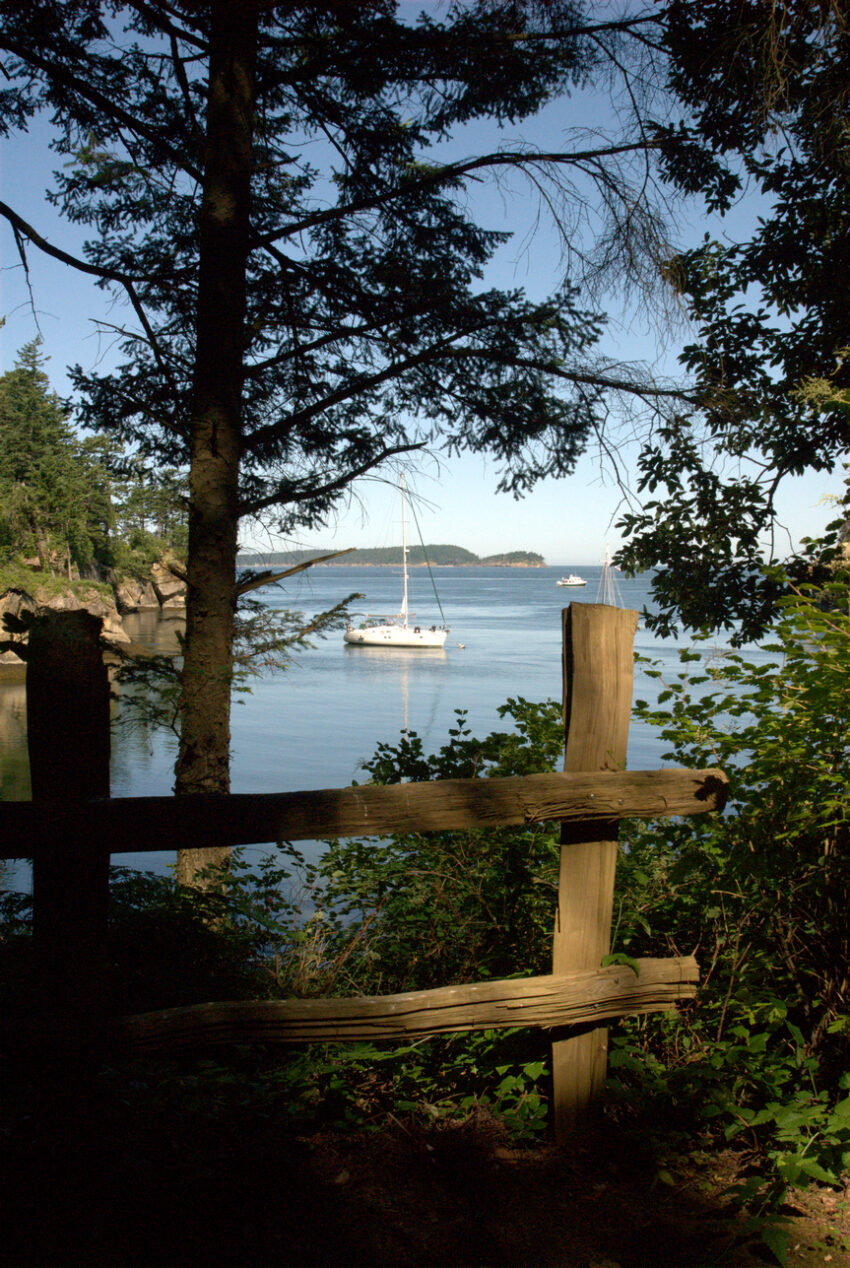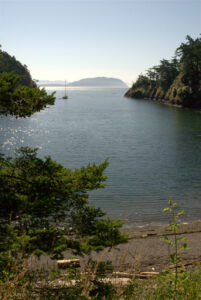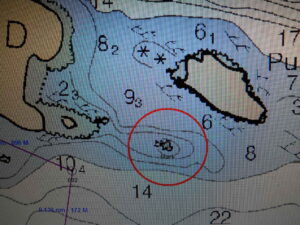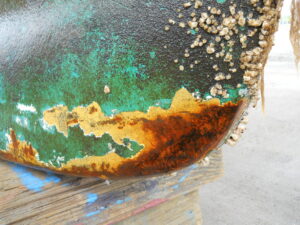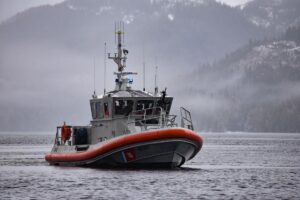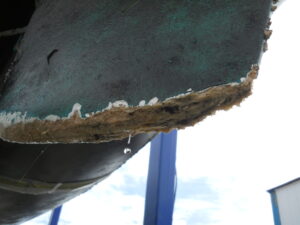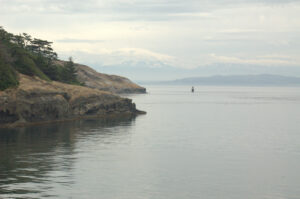By Jim Farrell
Many years ago, and they were back to the scene of the almost tragedy. Not only at the same island group, same island, but two of the same payers greeted them at the dock, as much surprised to see the other two as they were seeing them. The two were San Juan Island Park Rangers that just last year had attempted to help some very foolish sailors. OK, one very foolish sailor, and the first mate who tried to tell him to go to port, that said, the great sailor of many years experience decided to go to starboard instead. Why you ask? Well……….now the rest of the story.
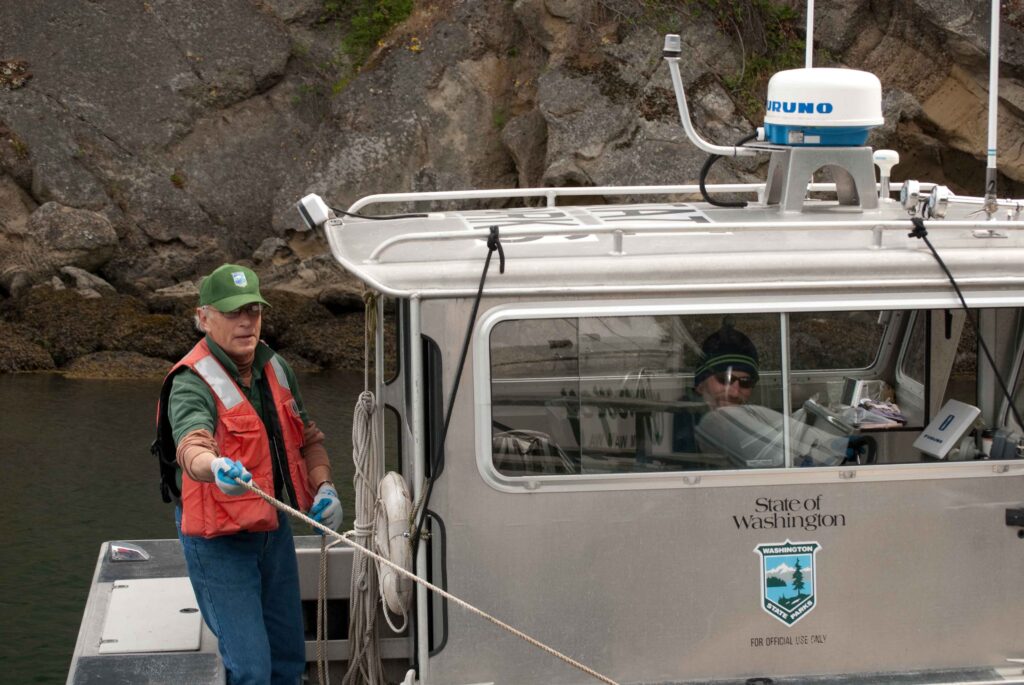
4th of July weekend, sailing in the San Juan Islands, just the right start of their couple of months summer sailing. Great winds, nice weather, or what counts as nice in the Pacific Northwest. Life was good. They had stopped at Matia Island for a couple of days to let the July 4th crowds dissipate and do a little photography while stretching their legs on land. While walking the trail through the tall old growth forest that goes around the island, the captain happened to see another sailboat leaving a quiet bay on Matia just off Puffin Island. Thinking to himself; “that looks an excellent place to anchor tonight”. He told his first mate in life about it and, looking for more peace and solitude, they decided to move.
A quick look at the chart showed some rocks just off both islands with a path open into the little bay that looked doable to go between. Now, why would anyone even think of checking into the tide current when you’re just going around a small island to duck into another little cove? Thinking about the quiet bay, they let loose of the mooring buoy and headed around the island. It couldn’t have been a more perfect day for a short sail. Winds to 12 with just a little wind wave, clear skies and warming.
They had a fair with blowing gently on them as they motored around the island toward the fantastic anchorage when all of a sudden, as what sometimes happens while sailing, everything went bad, quick! The ever faithful first mate was down below watching the real time chart on the computer, while the captain was at the helm with the paper chart. The first mate yelled at the captain to go to port, but the captain was looking at fast water in that direction that looked like it was flowing around rocks. To his starboard looked like more rocks, while straight ahead looked like the channel that he was seeing on the paper chart in his hand.
Meanwhile, the current was running on the fast ebb, pulling the boat an additional five knots along with the one the boat was moving. The first mate by now screamed at the top of her lungs to go to port. The captain had finally seen the problem to the starboard where there was water cascading over the flat rocks he had seen on the chart, and frantically threw the transmission into reverse, applying full power. The propeller tore into the water as it tried to propel the boat backwards, only to achieve about three knots before the ebbing current forced the boat not only into the rocks, but up onto them!
First there was a huge crash, followed by the screeching and tearing sound of steel on rock as the boat tried to find a way through the rocks by herself. She turned first to port then spun around to starboard when the rudder caught on rocks, as if jerking the helm away from the captain who had betrayed her, still trying to find her own way. More grinding of the keel as she started to list to starboard as the fast moving water forced the ship to go where it wanted her to go, not the route she wanted to follow. Her rudder became stuck amidships between two rocks, unable to respond to the sweaty hand of the captain.
By now, the first mate had flown up on deck and tried to make out what had happened and what the captain was doing about it. The boat was sitting on top of the flat rocks as if placed there by a giant playmate, defying the push of water hitting her port side, forcing her over to starboard against her will. She still was trying to free herself as she sat there; rising up as each wave that came from Orcas Island and each wake the passing power boats left as they sped by.
The captain was reacting to the situation and made preparations for the survival of the boat and crew. On went life jackets, fenders over the starboard side and the dingy launched over the side as well. Into the dingy went the 45lb extra anchor with chain rode spliced with rope, along with the worried captain. The first mate rose to the challenge even though she was fighting the fear that was gripping her stomach and played the rode out as the captain rowed hard away from the boat with the kedge anchor, dropping it into thirty feet of water off the starboard side. The first mate took a strain on the kedge, trying to keep the boat from bouncing and twisting on the rocks, while the captain worked his way back to the boat in the strong current created as the tide ebbed out.
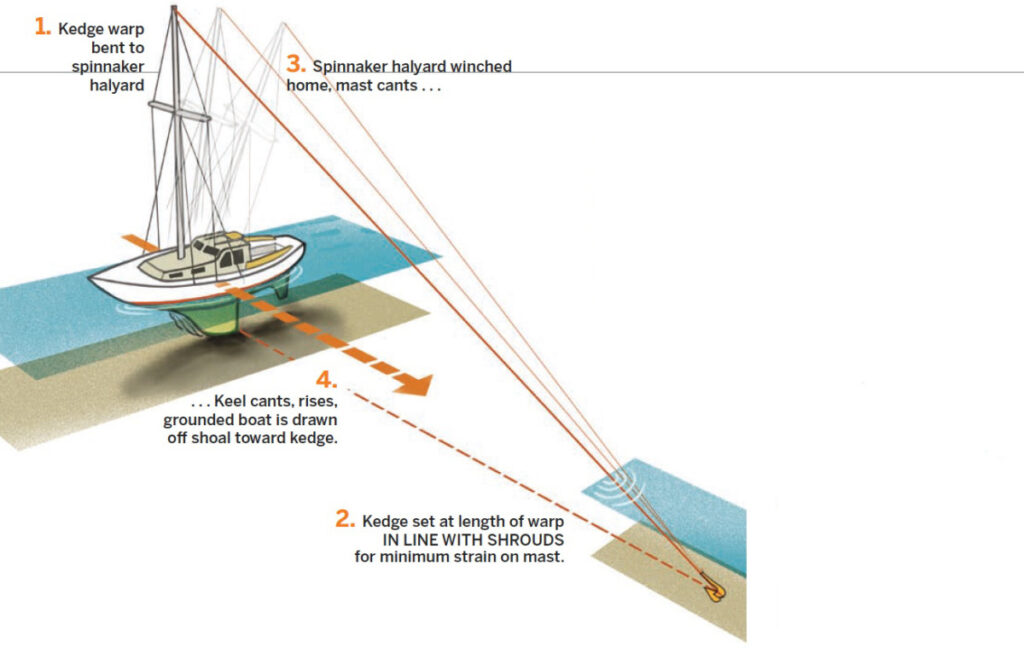
Once aboard the boat, the captain attached two full seven gallon water jugs to the end of the boom and pulled the boom until it touched the shrouds on the starboard side in an attempt to careen the boat enough to clear the rocks and find clear water. Unfortunately, pulling in on the kedge and careening the boat to the starboard, still wasn’t enough to set her free.
Now it was time to call the Coast Guard and notify them of the boat and crew’s predicament. No water was coming in, life jacket on the first mate and the boat not going anywhere soon; at least not down as she was already down as far as she could go. The call was made, and the crew was requested to call in every half hour to apprise the Coast Guard of their condition. The Park Rangers who were working in Rolfe Cove heard the call and decided to see if the crew of the boat needed help. When they came up to the stricken vessel, they talked with the captain and decided to take a halyard and put a strain on the mast to careen the boat over further that all were hoping would be enough to refloat the boat. A strain was applied by the Ranger’s work boat, but the water had ebbed out even further making it impossible to come off the rocks, only to further punctuate the situation when a knot came undone and snapped the halyard back to the boat, taking with it the wind vane.
Reality hit the crew hard when they finally accepted that their precious vessel was not going to come off by herself despite all their labors and what seemed the wishes of the boat herself. She began to settle more to starboard as the tide ebbed further; forcing her portholes under water until if a fish swam by it could be easily viewed. The boat herself seemed to decide that she wasn’t going to go over any further in total defiance to Davy Jones and his raging current. Low tide was going to be in about two and a half hours so the crew decided to wait it out in hopes that they could float her off as it came back in.
The captain went below to make sure all thru-hulls were turned off and the boat wasn’t taking on water, walking on the cabinet doors as he went fore and aft. The first mate found a spot to brace herself, taking up the companionway as her own safe haven -that surprisingly she found comforting. Calls went out to the Coast Guard every half hour as requested and the crew discussed possible ways to tackle the problem. Some thought was given to leaving the boat, but they were short lived as the crew felt the boat was a part of them.
As the tide turned, a small sailing-vessel came over to investigate the stricken boat and see if they could give any assistance. The captain asked if they would mind taking some soundings around his vessel and let him know the readings. By now there was enough water under the boat that every time a powerboat went past a large wake would rise the boat up off the rocks a little, not enough to free her, but enough to make her shudder as she crashed back onto the rocks. The sounds of her crashing sounded as if she was going to be pounded apart, bit by bit. The crew of the little sailboat told the captain that clear water was back to the port. The captain decided to put the outboard on the dingy and motor over to where he had set a trip line on the anchor and pull it aboard the tender, and reset the kedge to the port.
The tide was now in full flood, pushing against the starboard side of the sailboat, placing an enormous strain on the anchor rode. The captain pulled, jerked and fought to release the anchor, but as he was sweating to get the anchor up, the boat could be heard crashing again and again with each wave. The captain yelled to the first mate to go forward and prepare to toss him a line attached to the port forward cleat so that he could rig a bridle and try to swing the bow to port and clear water. He had decided for the survival of the ship, the anchor would have to be lost. He cut the rope rode and tied a small fender to the end with the slim hope of coming back later to retrieve it.
This task complete, he motored to the port side of the ship and received the tossed line from the first mate. Rigging a bridle to the tender and attaching it to the line from the ship while bouncing in a nine foot Zodiac proved difficult. Observing the difficulties of the captain the first mate grabbed his life vest and threw it into the Zodiac. The captain was too busy to put it on as the line had become wrapped around the outboard shaft. He half stood up to reach back and tilt the outboard forward to untangle the line, when a wake from a passing power boat hit the tender’s bow, tilting it up and flipping the forlorn captain and the dingy completely over into the fast flowing waters.
Cold water hit the captain like a thousand needle pricks as he went under the water, but his adrenalin was running so high that when he swam for daylight he popped out of the water like a cork, grabbing a breath of air as his life depended upon it, which it did. Floating next to the befuddled captain was a small fishing net float he had found a few years back and had left in the tender. For some reason the captain grabbed it with the expectation of what he didn’t even know, looked at it, looked at the tender floating upside down thirty feet away and decided to swim to the upset tender. Upon reaching the tender, he was able to propel himself up and onto the upturned Zodiac and get totally out of the freezing water. As he was laying there, his life preserver was floating past, and he somehow had the foresight to reach down and grab it to put on.
Laying on the upturned tender, he looked out into the channel between Matia and Orcas Islands, and the Coast Guard cutter that had just arrived was launching its Zodiac. While laying on the dingy, the captain’s cell phone began to ring as it was still attached to his belt. Surprised it still worked, he answered it and low and behold it was the Coast Guard asking him why he hadn’t been making his half-hour callings. Why? They asked, well the answer didn’t immediately come to him, but laying there with his feet in the cold water, his precious boat still crashing on the rock with his loving first mate aboard, he could only tell them that now would be a good time to come to the scene of the mishap and help out.
The captain decided that the best solution would be to wait for the Coast Guard to do what they do best when the first mate made the remark “would you like me to pull the dingy over to the boat”, noting that the line she had so diligently tossed to the captain was still attached both to the tender and the boat. The captain decided that it would be better to be aboard the vessel than laying on the dingy with his cold feet still in the water and have the indignity of being helped off the upturned dingy by the Coast Guard. The first mate pulled the captain and upturned dingy back to the boat where he was able to climb back aboard and attach it to the boat.
As the captain came back aboard another surge upward was felt as the sailing ship arose off the rocks as if she herself had made sure that the captain was back aboard and safe and it was time to head for deeper waters. The rudder swung free and turned to port on the next swell and the crew who had already started the engine, threw the transmission into forward gear in answer to the ships wishes, propelling them off the rocks and into clear water! The dripping wet captain had the first mate take the helm and rushed about the ship to clean up all the cordage, water cans, and lines tailing in the water.
The ship? Well, she had freed herself in spite of rocks, crew, and Davy Jones’s best effort. Off she sailed toward the Coast Guard who came aboard her for an inspection and help flipping the tender back over, along with settling the crews’ frayed nerves. The Captain and the Coast Guard boarding officer walked through the boat to make sure there was no water coming aboard.
The captain and mate decided to head into the little cove, anchor and check the bottom out. The captain donned his scuba gear and off the end he went. Below he found two to three inches of rudder ground off and some of the keel bottom paint missing. No other damage apparent. The crew decided to spend the night in the cove and return back to the marina the next morning, as they were beyond tired.
Once back in port, the vessel was hauled and put on the hard where cracks were found in the cross frames and after working on her for a month she was back in the water, better than new. The boat had survived what could have been a tragic breakup and the crew a cold swim to the island. Was it the crew who saved the boat, or the boat who saved the crew? The crew knows.
The quite-cove, was it worth it? No, it had waves hitting it all night causing the crew and ship a restless night and even in the best of situations, the dock and mooring buoy are the best bet for visiting a beautiful and restful Island like Matia.

